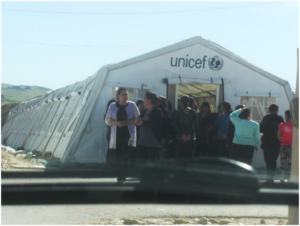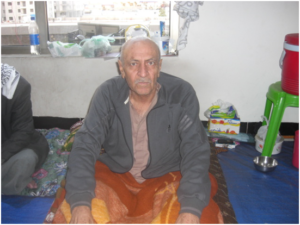Messages from Iraq: Erbil
from Cathy Breen, Erbil, Kurdistan, Northern Iraq, April 28, 2015
Dear Friends,
Each year Catholics read from the Book of Acts in the period following the Easter celebration of the resurrection of Jesus. This morning’s reading speaks of “those who had been scattered by the persecution.” Over a span of more than eight years, I had ample opportunity as Voices for Creative Nonviolence to meet many Iraqi Christian refugees in Jordan and Syria. I was often gripped by their stories, and the visions and dreams given to them as the “suffering church.”
Last September I had hoped to travel to the village areas surrounding Mosel to hear their voices, so often neglected since the U.S.-led war on their country over a decade ago. And then as we know, in early June of 2014, ISIS took the city of Mosel. I write all of this to help explain the deep emotions that welled up in me as I entered one of the compounds for Internally Displaced Persons (IDPs) in Erbil just two days ago. The Sunday service had just ended and people were streaming out of the tent that serves as their church.
 This compound, called Ozal city, in the Kasnizan area of Erbil in Kurdistan, houses approximately 900 Christian families, 400 Muslim families, and 35 Yazidi families. It is just one of many compounds in Erbil. Almost all of the Christians in this complex, if not all, come from the village of Qaraqosh, a Syriac Catholic enclave, outside of Mosel.
This compound, called Ozal city, in the Kasnizan area of Erbil in Kurdistan, houses approximately 900 Christian families, 400 Muslim families, and 35 Yazidi families. It is just one of many compounds in Erbil. Almost all of the Christians in this complex, if not all, come from the village of Qaraqosh, a Syriac Catholic enclave, outside of Mosel.
In early August in a 24 hour period, more than 50,000 fled Qaraqosh, the total population of that village together with thousands they had given refuge to from Mosel. I would visit about eight or nine families in the course of the day, meeting the children and hearing accounts of their situations. Some of them were unable to share any of the details of their fleeing ISIS. It was just too painful.
It is important to note that the majority had fled their village twice, the first time in June due to warnings from ISIS, aka Da’ash. But after a few days the families felt they could return. On August 6th however, in the span of 24 hours, over 50,000 fled Qarakos. Da’ash had given people three days to decide their fate. To convert and pay money, or be executed.
As ISIS surrounded the village, they were able to stop people on the road as they fled. Cars were taken, and all of their money and jewelry. Even, at times, suitcases. One fighter took a baby’s bottle saying “Christians don’t have the right to live.” People continued on foot in the merciless heat with just the clothes on their back. The absence of suitcases and household items in the rooms I visited testified to this. Not a single family photo was on display.
One sister told me she knew a family where ISIS took the three year old daughter, never to be seen again.
Three Dominican sisters live among the displaced, as well as two Redemptorist priests and a brother. They too are from Qaraqosh. One of the priests was wounded in 2004 when his car was crushed by a U.S. tank. A fellow priest in the car was killed. The priest who met with me can no longer go up the stairs as both of his legs suffered multiple breaks. A handsome man, he told us “This was my first experience with Americans….Many people translating for the U.S. were killed…We are wounded on the inside.” He feels that people are being called to live in peace, respecting one another. “The differences between people is a source of richness for us. Our God is our future, we are on earth temporarily. Our God is our future” he repeated.
The other priest, dynamic and just as good looking, wanted to speak without a translator.
“The U.S. government has two faces: one of diplomacy, the other of Da’ash. Everyone knows what America is doing. America must confess and admit ‘We have killed people and now we need to ask for forgiveness’. …The U.S. has not only destroyed a country and a people, but the culture. And not just of Iraq. Of Syria, Lebanon, Palestine….”
It has been over a year since I have been in Iraq, and on this trip I have heard repeatedly in every place I have been, Muslim or Christian, a strong belief that Da’ash is a creation of the U.S., that the U.S. is responsible for Da’ash and is out to destroy Iraq. People ask themselves, and me, why?
The Dominican sister acting as my guide and translator throughout the day was as tireless as she was gracious. In the late afternoon we came upon an older gentlemen who was sitting on a mat visiting with two other men. This was in yet another compound in Erbil housing about 160 displaced Christian families from Qaraqosh. Some of the families are living 20 people in a small space.
Upon learning that I was from the United States, Mr. Shukrallah (which means thanks be to God), became agitated and angry. “I want to write a letter to Obama” he said shaking his finger at me, ‘in the name of everyone here.‘ “
“I want to tell him that America did nothing for us. They did this to me.” He has bone cancer. “We have nobody. Only God, because we are Christians. Obama sent the dogs [ISIS} to eat us. This is the reality. You have to bring my voice to Obama. Say to him for all the Christians from our village : You did bad for the Christian people in Iraq. I have cancer and cannot walk. In some way, Saddam Hussein was better than Obama even though he was a dictator. Because he [Saddam] did not treat us in this way.”
 He wanted my word. He wanted a promise from me that I would get this letter to Obama. I told him that ordinarily I would have little hope that such a letter would reach the president. But, I told him, because of all the faith I had witnessed this day in the people around me, I felt that such a miracle could be possible! As we took our leave, Mr. Shukrallah’s anger had dissipated and he pressed my hand warmly. I find there is a great need for Iraqis to be able to express themselves to someone from the U.S. It humbles me to be the representative.
He wanted my word. He wanted a promise from me that I would get this letter to Obama. I told him that ordinarily I would have little hope that such a letter would reach the president. But, I told him, because of all the faith I had witnessed this day in the people around me, I felt that such a miracle could be possible! As we took our leave, Mr. Shukrallah’s anger had dissipated and he pressed my hand warmly. I find there is a great need for Iraqis to be able to express themselves to someone from the U.S. It humbles me to be the representative.
There is much to write, but it will have to wait. Everyone, without exception, wanted to return to Qaraqosh. Everyone, without exception was tired and worn, worrying about the future, not seeing any way out. But each one, without exception, said their faith had deepened in these times of great trial. I assured them that many people come with me on this trip wanting to express their solidarity and friendship. When I asked what, if anything, we could do the response was
“Pray, pray, pray.”
————————————–
Cathy Breen is a Catholic Worker who lives in NYC, and has made many trips to Iraq since the first Iraq War and the imposition of draconian sanctions of Iraq in the 90s. She has been there at least twice over the last 3 years. This is the second of a series of reports she wrote during her most recent trip this spring.